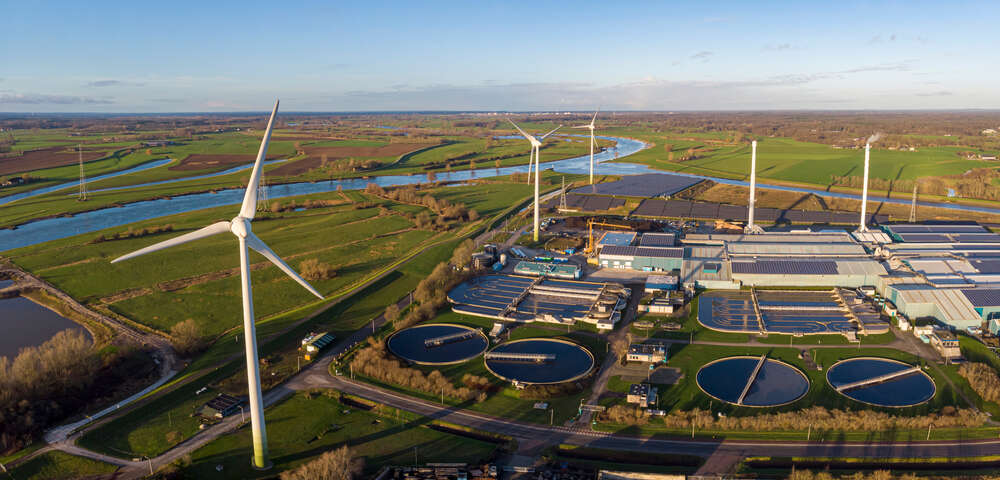

- Since 2019, the share of fundraising by infrastructure funds linked totally or partially to renewable energy has grown to 92%.
- 83% of respondents to a recent LTIIA and PwC Luxembourg survey said that investing in the energy transition is non-negotiable.
- A Morningstar report finds that the ramp-up of renewables has been hampered by rising interest rates and construction costs.
Infrastructure is an essential building block for adapting to climate change. The sector is disproportionately responsible for both greenhouse gas emissions and adaptation costs.
It sat at the heart of last week’s Second National Infrastructure Assessment in the UK – a review conducted every five years by the National Infrastructure Commission.
The report is up front about the need for significant public and private investment in infrastructure. “The good news is that modern, reliable infrastructure can support economic growth, help tackle climate change and enhance the natural environment,” writes John Armitt, chair of the National Infrastructure Commission, in the report’s forward.
The message is getting through. The growing awareness and prevailing emphasis on ESG considerations in the asset management sector are already making the energy transition the dominant global investment theme.
Between 2019 and 2022, there was an 18.5% increase in infrastructure assets under management. More to the point, since 2019, the share of fundraising by infrastructure funds linked totally or partially to renewable energy has grown to 92%, making up $132bn out of a global total for infrastructure funds of $144bn last year.
Those figures are from a new report by the Paris-based non-profit professional association the Long-Term Infrastructure Investors Association (LTIIA) and PwC Luxembourg, which looks at energy transition trends and their implications for institutional investors in infrastructure.
Vincent Levita, chair of the LTIIA, calls the energy transition the “linchpin” of efforts to combat climate change. “In this volatile environment marked by geopolitical conflicts, economic instability, and an increasing frequency of climate change-related disruptions, it is crucial to prioritise adaptability, innovation, and a dedication to ESG principles,” he says.
Non-negotiable
The report makes clear that investor sentiment towards investing in the energy transition is non-negotiable. The vast majority of LTIIA survey respondents (83%) consider the energy transition not just an investment opportunity, but rather a part of their fiduciary duty.
The survey within the report polled members of the LTIIA working group, encompassing asset owners and asset managers from January to June this year and included Allianz Capital Partners & Global Investors, Arjun Infrastructure, Campbell-Lutyens, CCN, DBJ, EIB, Infranode, InfraVia Capital, Meridiam, Manulife, Palladio, PRO BTP, PwC Luxembourg, Rivage, Skandia, STOA Infra & Energy and S&P.
The report concludes that roadmaps and stable policies as well as supportive regulations are required from policymakers, but it makes recommendations for asset owners and managers too.
First, it encourages investors to widen the scope of eligible assets. Stakeholders should focus on energy transition projects that go beyond core renewable energy generation and which incorporate transmission grids as well as digital and storage elements.
They also need to shift their approach to customers and move away from a subsidy-driven approach to build a strategy. As renewable energy takes a larger share in the energy mix, with its inherent intermittency challenges, direct and interactive relationships with customers will become essential. “The commoditised approach of old should be discarded,” the report recommends.
And fund managers themselves, need to change. As the market moves from traditional core infrastructure models backed by long-term power purchase agreements with public utilities and feed-in tariffs to what the report describes as “a more merchant power market”, they must adapt their approach.
“Embracing a value-added strategy will be the key to capitalise on the growth opportunities in the infrastructure market,” it says.
If the sector wants to contribute to the energy transition “flexibility is crucial”, the more so given the headwinds of rising geopolitical and macroeconomic uncertainties and disruptions.
Infrastructure: obstacles to growth
All good news, but the transition, especially in Europe, is not going to be easy. The ramp-up of renewables, explains Tancrède Fulop, senior equity analyst for utilities and renewables at Morningstar in Amsterdam, had been propelled by falling interest rates and declining construction costs. Since the end of 2021, he says, these have reversed and have become instead “obstacles”.
A new Morningstar report – 'Renewable Power Adoption: Easier Modeled Than Built' – highlights the problems that have emerged. Offshore wind costs have soared 50%, the report says, because of higher construction and capital costs. This has resulted in project impairments, renegotiations and failed auctions. It concludes that prices will have to increase substantially to ensure that renewable targets are met. More to the point, it is not expecting a bounce back.
Morningstar expects pressure to remain on offshore wind costs and risk renewable energy targets. “This all will likely translate into higher power prices, which will likely raise political opposition, threatening the very targets themselves,” it concludes.
Francois Bergere, executive director at the LTIIA, admits that net-zero goals remain “challenging to attain” but governments cannot bear the financial burden of the energy transition on their own. It is even more crucial for the private sector to “bridge the investment gaps”.
[Read more: How transition finance is shaping the path to a net zero economy]





